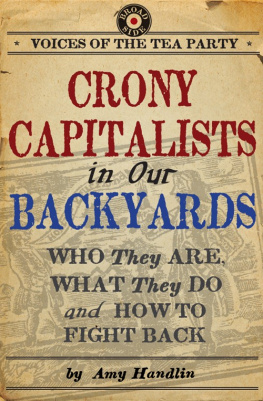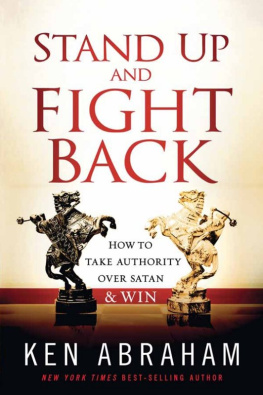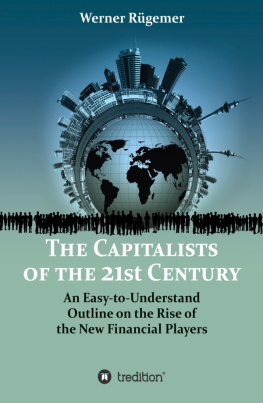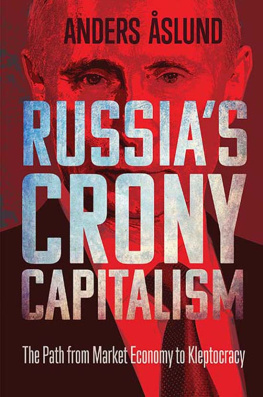This e-book is dedicated to the many honest officials and dedicated citizens groups I have been privileged to know during my years of public service.
V oices of the Tea Party is a real-time collaborative forum for Tea Partiers around the country that delivers in-depth information on tactics, strategy, and policy from on-the-ground activists through the use of inexpensive and easy to download e-books. The series will serve the vibrant online community of everyday Americans who launched and continue to drive the Tea Party movement, by taking their collaborative discussions to a much higher level. Tea Party supporters around the country will now be able to instantly access best practices that have succeeded elsewhere, hear the stories of others in the movement, and learn from Tea Partiers with specific policy ideas and expertise. Perhaps more important, they will be able to engage with other thought leaders by submitting their own e-book proposals for possible inclusion in the series. (Please see our website for details: broadsidebooks.net.) Readers and writers alike can thereby join the important national discussion within this ever-expanding community of citizen-activists who have dedicated themselves to securing the movements core values of constitutionally limited government, fiscal responsibility, and free markets.
Series editor Michael Patrick Leahy has been one of the driving forces of the Tea Party movement from its inception. Hes a co-founder of the Nationwide Tea Party Coalition, which sponsored the very first national Tea Party demonstrations; the February 27, 2009, Nationwide Chicago Tea Party; and the April 15, 2009, Tax Day Tea Party. He is also the author of The Ideological Origins of the Tea Party Movement , to be published by Broadside Books in January 2012. His website is http://www.michaelpatrickleahy.com.
Dont Get Burned by the Burner!: My First Encounter with Crony Capitalists
I f you want to survive in this business, keep your mouth shut.
That was the first piece of advice I got as a newly elected member of my countys governing board in the 1990s. I was an idealistic political neophyte. My self-appointed mentor was a jaded party boss, one of the longest-serving political strongmen in the state. To me, accountability was key to integrity. But among his sycophants and hangers-on, this was a silly notion for suckers, fools or wimps.
I remember being struck by his reference to government service as business. With both an MBA and a doctorate in marketing, I thought I knew the difference between business and government: one was a profit-making enterprise, while the other was the institutional guardian of citizen rights. But I soon learned that government could become one big ATM machine for those who were smart, slick and unscrupulous enough to exploit it. There was nothing wrong with serving your constituents, if you were naive enough to think they mattered. But the way to get ahead was to amass power, and power meant the ability to control jobs and contracts.
About what, exactly, was I supposed to keep my mouth shut? It didnt take advanced degrees to figure that out. Two major topics were off limits when talking to ordinary citizens or the media: who made money from the system and why they got so much.
I violated the rules of this sordid game within a few months when I opposed the boss pet project: a $60 million garbage incinerator. It seemed to me oversized, overpriced and under-scrutinized. A humungous, noisy industrial facility plunked down amidst homes and schools was sure to hurt property values and quality of life. For starters, it would spur a parade of garbage trucks and spew plumes of pollutants into the air around the clock. Its supporters trumpeted the fact that the design of this burner was uniquewhich meant no one could predict how effectively it would operate, for how long or at what total cost.
True, the county had a trash disposal problem. But I couldnt understand the passionate commitment of the boss to this single, over-the-top solution. Garbage is hardly a matter of ideological certainty or religious conviction: Why the refusal to consider other options?
I wasnt the only one asking. In those pre-Facebook days, it wasnt easy for citizens to organize across a county with 53 towns and over 600,000 residents. But anger is a powerful motivatorand people were angry at the dearth of answers to legitimate questions about the incinerator. With little money and no technology more sophisticated than telephones, they mobilized by the thousands, packing public meetings and dominating local media coverage of the controversy.
Over time, the key facts began to come out. While a massive, multi-year construction project might not serve the countys long term interests, it would clearly make a lot of people rich. Already lining up were lawyers, engineers, and a jumble of assorted experts with hefty proposals and, in some cases, even heftier political campaign checks. Once completed, the incinerator could be run as an authority: a low-profile, unelected body with the potential to generate limitless numbers of patronage jobs and contracts.
It would have been a perfect marriage of power and politicsexcept for those proto-Tea Party groups. Like todays activists, the incinerators opponents met in living rooms and strategized in kitchens. They hit the streets with leaflets, petitions and yard signs that read Dont Get Burned by the Burner! By staging debates and rallies throughout the county, they forced supporters into defensive mode. Tellingly, while every opponent was a volunteer, it was hard to find burner apologists who werent on the payroll of some high-priced consultant.
As soon as they learned that I was leaning against the project, the prospective beneficiaries began to ply me with meals and trinkets. When positive inducements didnt work, the attentions turned ugly: I returned to my car after one especially contentious public meeting only to find that my tires had been slashed.
The intimidation tactics didnt work. Neither did a six-figure marketing campaign, bankrolled by vendors and complete with glossy mailings and radio ads recorded by the political boss.
Finally, the other county officials agreed to place the incinerator issue on the ballot. While New Jersey does not allow initiative and referendumwhich forces government to comply with voters decisionsthe board promised to abide by the electoral outcome. To this day, I believe the boss went along with this approach out of sheer hubris: After decades of muscling others out of his way, the prospect of losing this fight was simply inconceivable to him.
But lose it he did. Foreshadowing so many Tea Party battles to come, the incinerator proposal was supported by big money and defeated by the heartfelt convictionsand shoe leatherof thousands of ordinary taxpayers.
Years later, supported by many of the grassroots activists who had helped defeat the burner boondoggle, I was elected to the New Jersey General Assembly. During my first term I was assigned to the Assembly State Government Committee, which vets and molds anti-corruption bills. I had campaigned on the need to raise ethics standards in public service, and was eager to start cracking down on New Jerseys infamous legions of crooks. The committee chairman, Assemblyman Mims Hackett, began every meeting by reiterating his commitment to honest government. It seemed a good portent.












